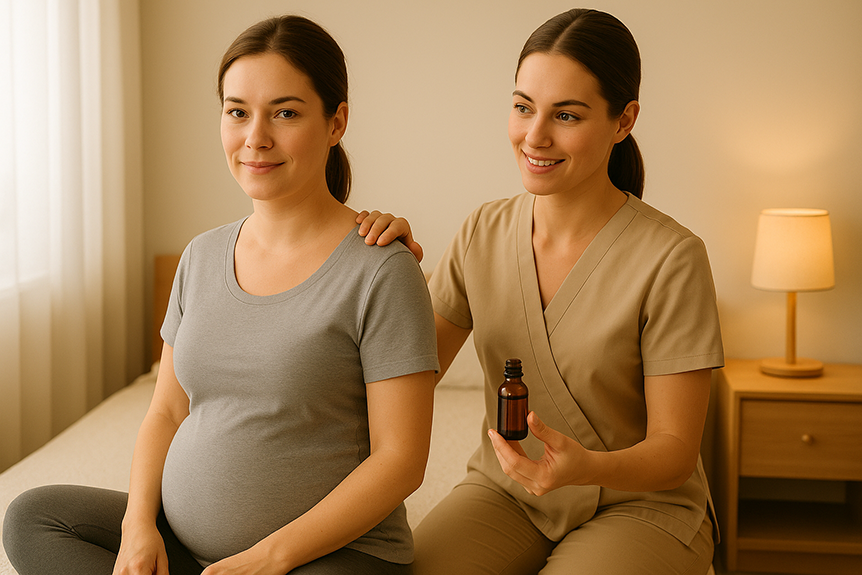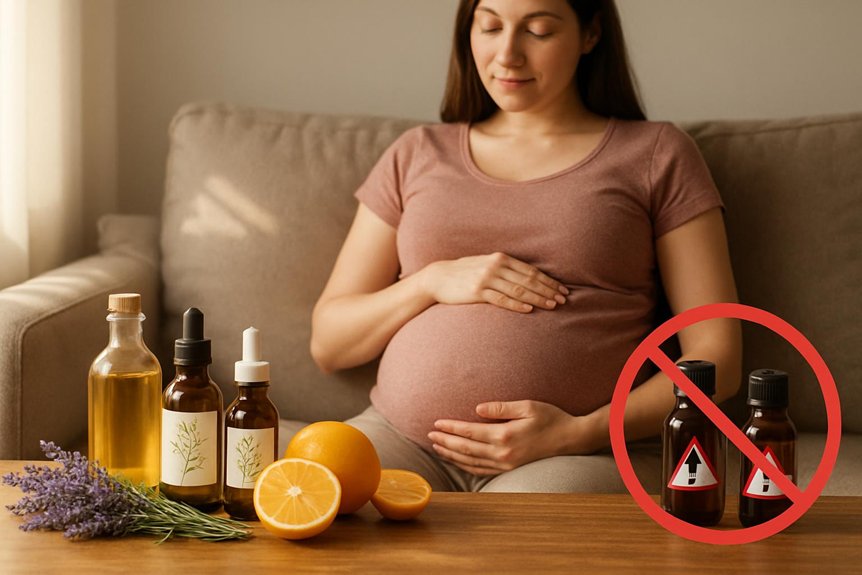Massage oils are generally considered safe for use during pregnancy when selected and applied with care by trained professionals. Clinicians typically use hypoallergenic, natural oils such as sweet almond, grapeseed, or coconut, and avoid products with harsh chemicals or known irritants. Essential oils are chosen with caution, as some can pose risks to pregnancy. Individual health status and sensitivities are also reviewed prior to use. More extensive information is available to address other factors and safety recommendations.
Understanding Prenatal Massage and Its Benefits

During pregnancy, physiological changes place unique demands on the body, and massage therapy—when delivered by qualified professionals—can help to address some of the associated discomforts. Spa & Massage’s therapists are specially trained to adapt techniques for expectant mothers, prioritising safety and comfort.
Evidence suggests that pregnancy massage may reduce stress, relieve muscle tension, and improve circulation, supporting both physical and emotional wellbeing. Commonly reported benefits include decreased lower back pain, reduced swelling in limbs, and better sleep quality.
Each session is carefully tailored, with therapists considering trimester, medical history, and individual preferences. While most individuals tolerate prenatal massage well, consultation with a healthcare provider is recommended.
The intimate, supportive environment at Spa & Massage fosters relaxation, nurturing a sense of connection throughout this transformative period. Techniques such as deep tissue massage can offer additional relief from muscle tension when used appropriately and safely for expectant mothers.
Types of Massage Oils Commonly Used in Our Clinics
At Spa & Massage clinics, therapists select massage oils with a focus on safety and comfort for pregnant clients.
The use of natural plant-based oils is prioritised, while essential oils are chosen with particular caution or omitted entirely.
Hypoallergenic options are also available to minimise the risk of skin sensitivity or allergic reactions during pregnancy treatments.
Natural Plant-Based Oils
Which types of massage oils are considered safest and most beneficial during pregnancy?
At Spa & Massage, natural plant-based oils such as sweet almond, grapeseed, and coconut oil are most commonly recommended. These oils are generally well-tolerated, hypoallergenic, and provide effective lubrication for gentle techniques.
Sweet almond oil, in particular, is popular for its mild scent and nourishing properties, supporting skin elasticity as the body changes.
Grapeseed oil, light and easily absorbed, is another preferred choice, especially for sensitive skin.
Coconut oil may also be used for its moisturising qualities, though therapist discretion is advised for clients with nut sensitivities.
All oils are selected with a focus on purity, avoiding additives or fragrances, to minimise potential irritation and promote a safe, soothing experience.
Essential Oils Precautions
A cautious approach is essential when considering the use of essential oils in massage during pregnancy.
Essential oils are concentrated plant extracts, and some may pose risks to expectant mothers or developing babies, especially in the first trimester.
At Spa & Massage, therapists are well-versed in the safety profiles of various oils and adhere strictly to best practices.
Only essential oils with established safety records for pregnancy are considered, and even then, they are used in low dilutions.
Certain oils, such as clary sage, rosemary, and basil, are typically avoided due to potential contraindications.
Consultation with clients remains a priority to ensure comfort and safety.
This careful attention helps foster relaxation and intimacy while prioritising the wellbeing of both mother and child.
Hypoallergenic Oil Options
Selecting suitable massage oils is essential during pregnancy to minimise the risk of allergic reactions and skin sensitivities. At Spa & Massage, therapists prioritise hypoallergenic options known for their gentle profiles.
Commonly, pure grapeseed oil and sweet almond oil are selected, as these are less likely to provoke irritation and are well-absorbed by the skin. These oils are free from harsh additives, fragrances, or synthetic ingredients, supporting a soothing, nurturing experience.
Before each session, therapists assess individual preferences and any allergy history, ensuring a tailored approach. For clients with heightened sensitivities, fractionated coconut oil is sometimes recommended due to its lightweight texture and minimal scent.
This careful selection process reflects Spa & Massage’s commitment to safety, comfort, and personalised care throughout pregnancy.
Essential Oils: What to Avoid and What’s Considered Safe

During pregnancy, careful consideration must be given to the selection of essential oils, as certain oils may pose risks to maternal and fetal health. Evidence indicates that oils such as clary sage, rosemary, basil, and juniper should be avoided, as they may stimulate uterine contractions or cause other adverse effects.
Conversely, oils like lavender, chamomile, and mandarin are generally considered safe in low concentrations when expertly blended and applied by trained therapists. At Spa & Massage, therapists follow strict guidelines, selecting only oils with established safety profiles for expectant mothers.
Dilution ratios are carefully controlled, and only external application is used. This approach ensures that relaxation and comfort are prioritised, while minimising potential risks associated with essential oil exposure during pregnancy.
How We Ensure Oil Safety for Expectant Mothers
With the wellbeing of both mother and baby as the primary concern, Spa & Massage implements rigorous protocols to guarantee the safety of massage oils used during pregnancy. Each product undergoes careful selection, ensuring it is free from known irritants, allergens, and contraindicated essential oils. Only high-quality, hypoallergenic oils are utilised, and all blends are formulated with pregnancy-safe ingredients backed by current evidence.
Therapists receive specialised training in prenatal care, enabling them to identify individual sensitivities and tailor oil choices accordingly. Before any session, client health histories are reviewed to avoid potential adverse reactions. Continuous monitoring and client feedback further refine these protocols.
Through these measures, Spa & Massage provides a secure, nurturing environment for expectant mothers, prioritising safety and comfort at every stage.
Recommendations for Prenatal Massage Aftercare
Although this massage is generally considered safe when administered by trained professionals, careful aftercare remains essential to maximise benefits and minimise potential discomfort. At Spa & Massage, therapists encourage clients to rest quietly following their session, allowing the body to fully absorb therapeutic effects.
Hydration is strongly advised, as increased fluid intake supports the removal of metabolic waste mobilised during massage. Gentle movement, such as slow walking, can help maintain circulation without overstimulating the system.
It is recommended to avoid strenuous activities for several hours post-treatment. Should any mild soreness or sensitivity arise, applying a cool compress can provide comfort.
In our clinics, therapists provide tailored aftercare advice based on each individual’s needs, ensuring that clients feel supported and nurtured at every stage of their pregnancy journey.
When to Consult Your Midwife or Healthcare Provider
Aftercare recommendations are an important part of promoting comfort and wellbeing following a prenatal massage. Spa & Massage advises that clients remain attentive to their bodies and promptly address any unexpected reactions.
Consultation with a midwife or healthcare provider is essential if a client experiences symptoms such as persistent abdominal pain, unusual swelling, dizziness, severe headaches, changes in fetal movement, or skin reactions to massage oils. These signs may indicate underlying medical concerns that require professional evaluation.
At Spa & Massage, therapists are trained to recognise when a client may need medical attention and will encourage open communication about any discomfort or uncertainty.
Prioritising safety ensures that the benefits of massage are balanced with the unique needs of pregnancy, nurturing both maternal and fetal wellbeing.
Conclusion
Just as a gardener selects the right soil to nurture delicate new seeds, choosing safe massage oils during pregnancy is vital for supporting maternal wellbeing. Spa & Massage therapists follow stringent guidelines—akin to the 2021 NICE review, which found tailored pregnancy care improves outcomes—to guarantee each session is both soothing and safe. Ultimately, with professional guidance and informed choices, massage therapy can be a gentle, supportive touchstone throughout the journey to motherhood.



